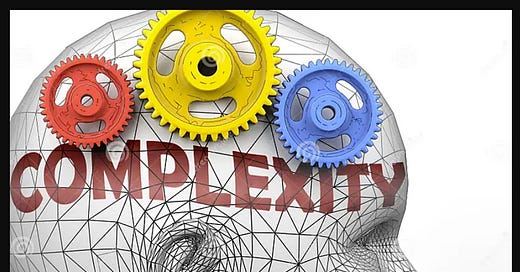Jessica Böhme posted For Those With Complex Lives which sparks some thoughts, as her articles often do.
Everyone has a complex life. We humans are complex systems and I do not mean this in a metaphorical sense. Each morning, in a sense, a new Self emerges from that com-plexity.
In the past 5.000 years there have existed dozens of complex civilisations. The Roman and Mayan Empires, the Xia and Han Dynasties, the Minoan civilisation.
Every one of them collapsed.
This is a difficult truth to face. Only one civilization has not collapsed, Modernity. But it is edging ever closer to collapse.
The metacrisis is a relationship crisis and the way relationship patterns show themselves on a global level reveal the same relationship patterns that are shown on the very local, personal level.
And I would add that part of that relationship crisis is our relationship with ourselves.
…making this shift in our thinking, understanding how it’s about changing those relationship patterns instead of trying to identify how to scale a solution to the global challenges, is key for our philosophical and thus for our mental health.
Perhaps changing relationship patterns is a key to scaling.
One way the complexity shows in our own lives is in the overwhelm of options and possibilities and in our inability to choose.
Yes. What is mine to do is a good question. It is not easy to find an answer but Jessica seems to have one for herself.
the "creal" …the third space that overcomes the dichotomy between what is real and what is possible.
Creal is a new word for me that lands rather well.
…our creative endeavors need sustained attention to crystallize from abstract notions into concrete achievements.
Unfortunately, in the SPACE I see far more creative ideas than concrete achievements.
Yet, as we all know, it's not that simple. Because if it were, stepping outside would be like stepping into an utopia. I’m not sure if we will ever create a collective utopia, but a personal one is a different story.
But Jessica, the metamodern objective is protopia rather than utopia, as explained by Hanzi Freinacht in What’s The Difference between Utopia, Eutopia and Protopia?.
Active observation is a pattern we can practice in our own lives to reduce the complexity. In a way, to prevent ourselves from collapse.
Or, as I often share, day after day I have a line from a 1980s rock song on a loop in my head: It's the End of the World as We Know It (And I Feel Fine).
To actively observe is to participate in the unfolding of complexity. While we might observe the complexity on a large scale, our focus lands on our ways of thinking, being and acting, right in front of us.
Yes, I am trying to be an observer of complexity in the world, in others and in myself.




